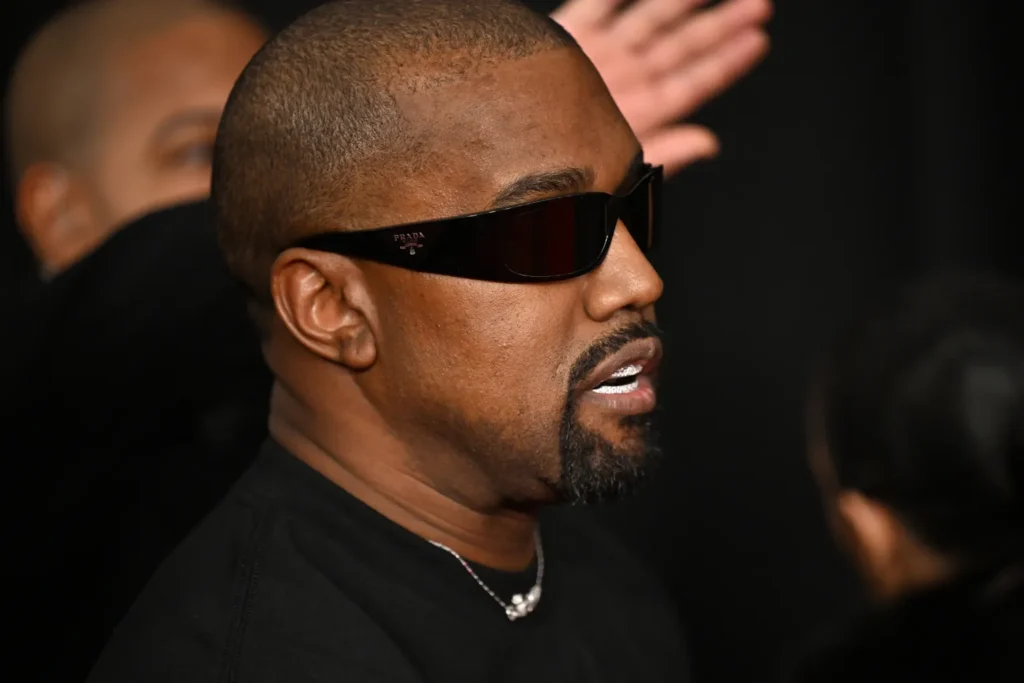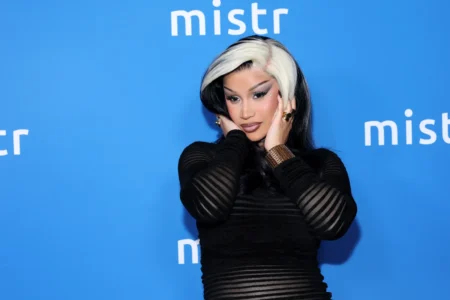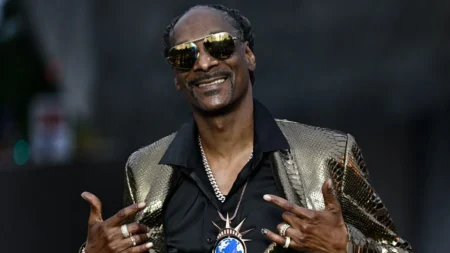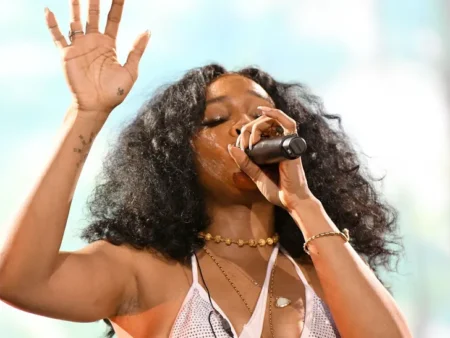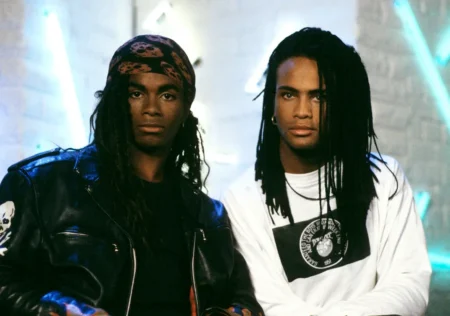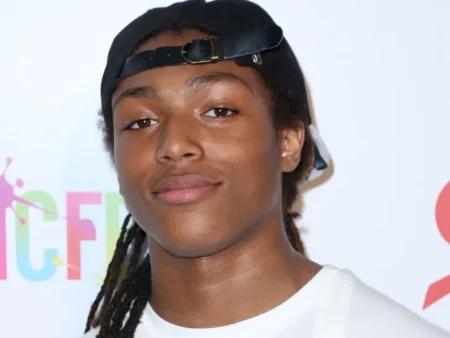Kanye West, known globally for his trailblazing artistry and headline-grabbing controversies, has once again ignited a firestorm across social media and the entertainment industry. The rapper-turned-fashion-mogul is under intense scrutiny following the release of his new music video titled “Heil Hitler”, a provocative piece that critics say crosses ethical and cultural boundaries.
The video is part of his upcoming album, Cuck, which is already being called his most controversial project to date—featuring incendiary lyrics, shocking visual themes, and provocative cover art that includes imagery of figures dressed in Ku Klux Klan robes. The release has spurred widespread outrage, sparking debates over artistic freedom, mental health, and the limits of provocation in pop culture.
A Provocative Opening That Stuns Fans and Critics Alike
The video for “Heil Hitler” opens on a jarring emotional note. Over a minimalist beat, Kanye delivers raw verses that reveal his ongoing personal battles, especially his estrangement from his children. “With all this money and fame, I still can’t get my kids back / With all this money and fame I still can’t see my children,” he raps—an echo of his public struggles with ex-wife Kim Kardashian over custody arrangements.
But any moment of empathy quickly turns to discomfort as the song takes a darker, more unsettling turn. With the line “I became a Nazi yet bitch, I’m the villain,” West veers into aggressively controversial territory. The refrain is repeated hauntingly, accompanied by grim visuals: a procession of Black men clad in primitive animal hides, marching in lockstep while chanting the volatile hook with tribal intensity.
Visually Alarming: Ritualistic Imagery and Dark Symbolism
The music video’s cinematic style leans heavily into dystopian themes. Set against a barren, apocalyptic landscape, it visually mirrors the chaos and inner turmoil that West alludes to in his lyrics. Viewers have described the footage as both hypnotic and deeply disturbing—designed to provoke, polarize, and dominate headlines.
The artistic direction appears to intentionally blur the lines between symbolism and spectacle, with some critics calling it “a calculated act of cultural sabotage” while others defend it as “unapologetically raw expression.”
A Glimpse Into ‘Cuck’: The Album That’s Breaking All Taboos
“Heil Hitler” is just the tip of the iceberg. The track is part of West’s upcoming album Cuck, a project rumored to include several equally provocative songs that explore taboo topics through a confrontational lens. Among them is “Cousins,” a track in which Kanye reflects on a disturbing childhood memory involving an incestuous experience with a family member.
In a now-deleted social media post, West described the song as “a mirror to the trauma I never processed.” The lyrics are raw and discomforting, offering a rare and unfiltered glimpse into the complexities of his early life. While some fans commend him for his bravery and emotional honesty, others question whether these stories should be shared through commercialized music.
Social Media Explodes: #CancelKanye Trends Worldwide
Within hours of the “Heil Hitler” video’s release, #CancelKanye began trending on X (formerly Twitter), Instagram, and TikTok. Influential voices in music, politics, and activism have weighed in, with some calling for a boycott of his album, his fashion brand, and any associated collaborations.
“Art doesn’t give you a free pass to dehumanize,” tweeted one activist. “Kanye West is intentionally stoking pain for attention.”
On the flip side, some die-hard fans argue that West is simply challenging societal taboos and forcing uncomfortable conversations. “This is what art is supposed to do—provoke,” one supporter posted on Reddit. “You don’t have to agree with it, but don’t ignore the message.”
History of Controversy: Kanye’s Pattern of Provocation
Kanye West has never shied away from the controversial. From interrupting Taylor Swift at the MTV VMAs to openly supporting Donald Trump, his career has been punctuated by bold, often polarizing moments. His 2022 tweet declaring admiration for Adolf Hitler, which led to widespread condemnation and professional fallout, is a precursor to the themes now surfacing in Cuck.
In a leaked version of “Heil Hitler,” there’s even a pointed line directed at fellow rapper Drake, further stoking the flames of their long-standing feud. The line was reportedly removed in the final edit, but its existence highlights Kanye’s continued appetite for confrontation in both personal and professional spheres.
Artistic Vision or Mental Health Crisis?
Many are now questioning whether Kanye’s provocative work is a sign of deeper psychological issues. The rapper has previously spoken about his bipolar disorder, and some industry insiders suggest that his increasingly extreme content may be a symptom of untreated mental health struggles.
Celebrity psychologist Dr. Sharon Lewis told Billboard, “There’s a fine line between genius and instability, and Kanye walks it daily. His art is brilliant but dangerous—especially when he’s unfiltered and unchecked.”
The Industry Reacts: Silence, Support, or Condemnation?
As of now, major music platforms like Spotify and Apple Music have not removed the song or video, though pressure from the public is mounting. Meanwhile, several brands previously associated with Kanye, such as Adidas and Balenciaga, have distanced themselves entirely.
No official statement has come from West’s team, and attempts by journalists to secure interviews have been denied. Insiders say Kanye is focused on finishing the album and views the backlash as part of his “creative process.”
What This Means for Kanye’s Career (and the Industry)
Whether seen as an act of bravery or a moral failing, Kanye West’s latest project is undeniably reshaping the conversation around art, fame, trauma, and responsibility in the entertainment world. The controversies surrounding “Heil Hitler” and Cuck could mark either a powerful comeback or a final rupture with the mainstream industry.
In an age where virality often trumps virtue, Kanye’s ability to dominate headlines—even at the cost of mass outrage—remains unmatched. But the question lingers: at what point does shock art cease to be art and become something more dangerous?
Only time—and the album’s full release—will tell.




